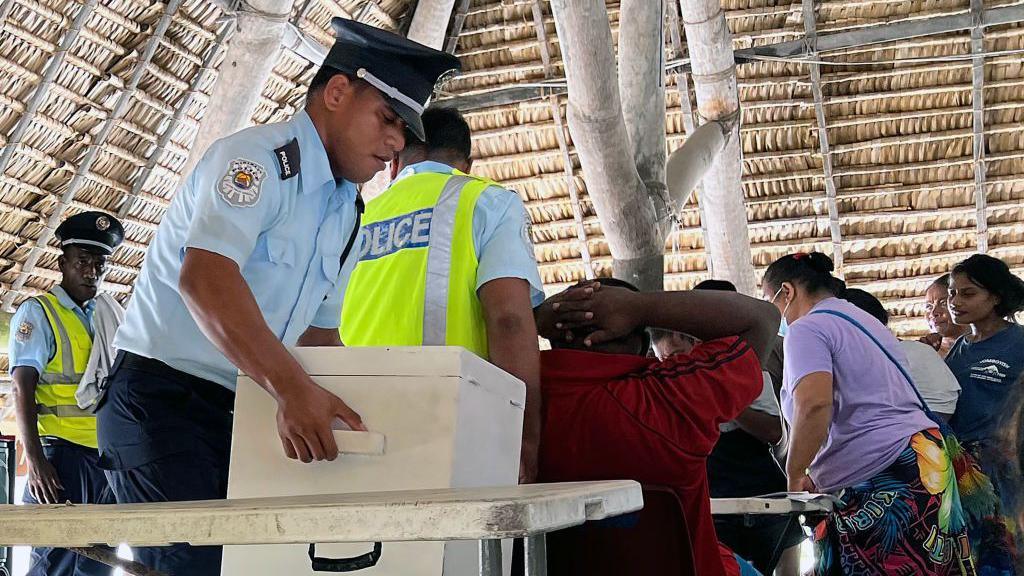Kiribati’s pro-China leader faces an election test

A police officer handles a ballot box as voters gather at a polling station during Kiribati's national elections.
- Published
The remote Pacific Island nation of Kiribati headed to the polls on Wednesday in a general election that could hold profound implications for the South Pacific region.
The archipelago, which has a population of about 116,000, is viewed as strategically valuable to both China and the United States due to its relatively close proximity to Hawaii and its relatively vast claim of oceanic territory, according to experts.
In recent years its government has also forged strong relations with Beijing, after current long-time President Taneti Maamau shifted the country’s ties from Taiwan to China in 2019.
Now, as President Maamau seeks to extend his near decade in power, outside observers are watching and waiting to see where Kiribati’s geopolitical allegiances will fall.
‚ÄúIn the space of five years we've seen a very rapid escalation of China‚Äôs political access, economic influence, and increasingly security access into Kiribati and the territory that it controls ‚Äď a hugely significant change brought on by the incumbent president,‚ÄĚ Mihai Sora, director of the Pacific Islands program at the Lowy Institute in Sydney, told ¬ť∂Ļ‘ľŇń News.
‚ÄúThat's the issue that‚Äôs at stake: this rapid escalation in ties between Kiribati and China.‚ÄĚ
On the ground, Mr Sora said, the I-Kirabiti people will likely have voted based on issues affecting them day-to-day, such as the cost of living, the economy, and the ‚Äúpoor state of government services‚ÄĚ.
‚ÄúBut internationally, of course, people will be interested in what foreign policy posture would a new government take,‚ÄĚ he added.
While US efforts to establish an embassy in Kiribati stall, China’s presence in the country has become increasingly tangible. In February, that Chinese police had begun working alongside local authorities on the ground in Kiribati.
Last month, China donated riot control gear to the Kiribati police force, saying it was willing to ‚Äúelevate China-Kiribati relations to a new level‚ÄĚ, according to a post on .
From China’s perspective, Kiribati has become increasingly strategically valuable as geopolitical rivalries in the South Pacific grow, according to Mr Sora.
It is for this same reason that warming ties between the two nations have stoked anxieties in the West.
‚ÄúUltimately the scenario that the US and allies will be looking to avoid is the establishment of infrastructure that has you seeing Chinese vessels on rotation in Kiribati, for example, or the placement of personnel,‚ÄĚ Mr Sora said.
“The implication of the incumbent retaining power is that this trajectory continues and China increases and consolidates its strategic access to Kiribati.
"And that changes regional security dynamics. It adds a security overhead to the Pacific Islands region that we haven't seen for a long time."
Blake Johnson, a senior analyst at the Australian Strategic Policy Institute, said from Kiribati’s perspective, China is likely seen as a valuable development partner that can provide support against economic and climatic concerns.
‚ÄúObviously a lot of these [South Pacific] countries are quite small, they're facing large climate and environmental threats, and so they need access to a range of partners to really keep building on their development. And that includes China,‚ÄĚ Mr Johnson told ¬ť∂Ļ‘ľŇń Newsday.
As people on the ground in Kiribati cast their votes, he added, they might have been questioning whether their government’s relationship with China is truly improving their quality of life, or negatively impacting it.
‚ÄúGeopolitics always come second to the everyday needs of the people,‚ÄĚ Mr Johnson said.
Mr Sora added that in many ways global geopolitical concerns have distracted from these more pressing, everyday issues.
‚ÄúYou have this competition for access and influence playing out in various ways‚Ķ but one of the criticisms is that it‚Äôs distracted from development partner support to traditional sectors like health and education,‚ÄĚ he said.
‚ÄúIt‚Äôs quite easy to demonstrate how geopolitics has distracted from key development issues.‚ÄĚ
Voting is not compulsory in Kiribati, and Wednesday's ballot is the first of two rounds in which citizens will select the country’s members of parliament. These will be followed by the vote for president.
The country’s last election was in 2020.